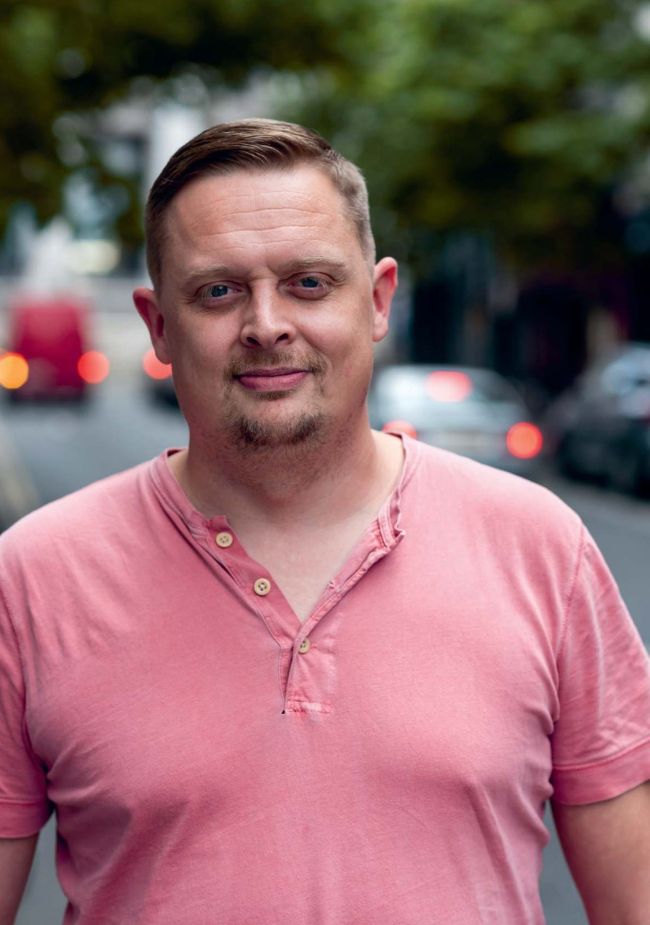Inside Out
Ger Roe is the Drugs and Alcohol Youth Worker at BeLonG To Youth Services, a service that not only provides support to young LGBT+ people, but empowers them to become agents of social change. We may think the queer kids have it easier nowadays, he says, but there are still massive hurdles for them to overcome.
My own life experiences are what led me to be a Youth Worker. I was an early school leaver, there’s addiction in my family, I come from a disadvantaged neighbourhood where opportunities aren’t great; life outcomes aren’t as linear as the rest of society. What emerged out of that was the realisation that we can continue to get educated, so I went back to school. While I was studying in Maynooth, training to be a youth and community worker, my lecturers said, ‘we want to see what you’re like with issue-based work’. So, I came to BeLonG To.

Photo by Babs Daly.
When I arrived at BeLonG To I was just blown away. The approach to youth work here is more about critical thinking. Youth work traditionally focuses on personal development of young people; it’s about intervening and giving them skills to fit into a society tailor-made for them already. Our approach is more like: hang on, there are certain issues in this society, so let’s engage young people to question that society. Let’s give them the skills and the capacity to go out and become agents of social change.
Since the referendum we’ve seen demand on our services increase ten-fold and that’s both positive and negative. It’s positive that young people are coming out and coming to BeLonG To, but also it puts a lot of pressure on us as a service to try and respond. I think in terms of marriage equality and what that has done, we definitely need to do a survey around public attitudes. It still takes a cultural shift.
We’ll need to see where we actually are in ten to 15 years time, especially with the homophobic/transphobic bullying stuff.
I’d hate to be 15 now. Older generations use that old chestnut that “they have it a lot easier than we did when we were young.”
I say, “Sorry, I’d challenge you right down to the core about that.” Young people are still coming in here experiencing bullying in their families, schools and communities. Family rejection, self-harming, suicide ideation are still huge issues. We’re also finding a lot of stuff around body image and eating disorders coming up. Throw drugs and alcohol into the mix and that exacerbates a lot of those issues.
We believe in a health-led approach to drug use in Ireland, rather than with criminal sanctions, because the biggest barrier young people from seeking support in here is the fear of criminality or stigma that the current system causes. A criminal sanction damages your prospects, your future career, your visas, your insurance and even in some cases, your education, all because you’ve had your own personal drug use. Young people seeking support around drugs should be able to feel that they can talk to someone, but they don’t. I see that as the biggest barrier to them accessing support or getting help.
I think overall as adults we tend to look at young people as a problem that needs to be fixed. My ideological position is that young people are potential that needs to be nurtured, irrespective of what they might be going through. You have these words that we use all the time: ‘troubled’, ‘difficult’ – that’s ‘problem-isising’ language that we’re placing on young people and it sets low expectations from the get-go. In BeLonG To we don’t use that language.
Our approach yields positive results. With traditional youth services there’s a pre-determined programme put in place for these young people to engage in. We’re the opposite. Young people create the programme that they’re going to engage in, so they’re engaged as equal partners from the start. We transfer power to young people and that means they’re engaged on all levels of decision-making.
It’s not tokenistic. There’s real empowerment actually happening here. Any action BeLonG To takes is done in consultation with young people. I suppose when you take away those other labels and show young people that they can do stuff, then you have them at ‘hello’.
This is more of a vocation, than a job for me. It feels like it was a calling. If I was in this job for the money, I’m definitely in the wrong job. It’s a passion, it’s an empathy, it’s an understanding to be able to look at young people sometimes and see myself, but I don’t think that’s enough. You have to be professional, you have to have expertise and passion in what you’re doing and have all theory to drive you – and life experience certainly helps.
The real value for the work is three years down the line, that young person running up to you on the street and jumping on you, embracing you with a big hug and just telling you ‘thanks’. And you tell them, “Don’t be thankful, you’ve done it yourself.” But that validation is satisfying because you know you’re doing something meaningful. There’s a lot of stuff that comes from the state around value for money and outcomes and measurements, but you can only measure so much. The real value lies in BeLonG To’s work is in the relationships we foster, and measurements and metrics can’t capture that.
We value our alumni, because they come back and volunteer, and they give. Maybe they’ve moved on, but they’ve gotten something and they actually want to give back, which ties into our overall model of change and supporting communities.
To find out more about BeLonG To’s work, visit
belongto.org